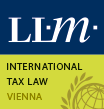The University Act provides for a total of 90 ECTS for the LL.M. program. The program is divided into eight blocks of lectures and comprises the following subjects:
Master thesis
- Master thesis 2025/2026 full-time program - general topic: Taxation of Services
-
Master thesis 2025/2026 full-time program - workshops
These workshops are directly linked to the introductory class on the general topic and will be held while students are working on their Master’s theses. The participants are introduced to the techniques employed in writing an academic piece of work. Support will also be given on methods of research, using international literature, and its systematic review. Students have the opportunity to show the results of their work in the form of presentations, and to initiate discussion and debate on the topics concerned. The problems which are presented in the final thesis will be discussed in class and possible solutions sought.
-
Master thesis 2025/2027 part-time program - general topic: Global Mobility in International Tax Law
The presence of individuals on the ground is a crucial element in domestic and conventional international taxation rules. Moreover, these rules assume that individuals and the labor factor in general have minimal international mobility. The digitalization of work challenges the paradigm of individuals' limited mobility and, consequently, threatens the proper functioning of the taxation rules on which it is based. In this context, this introductory lecture aims to: (1) Verify the dimension of post-pandemic cross-border mobility by studying, as far as possible, its relevance and essential characteristics (e.g., the phenomena of digital nomadism and whole/part-time cross-border commuting); (2) Analyze how these mobility phenomena affect the current domestic and conventional rules of international taxation and, in particular, those defining residence (of individuals and corporations), the concept of Permanent Establishment, and the source rules concerning types of income normally obtained by individuals (independent personal services, income from employment and pensions). (3) To study the various existing proposals to deal with the problems posed by applying the current rules as analyzed in (2).
-
Master thesis 2025/2027 part-time program - workshops
These workshops are directly linked to the introductory class on the general topic and will be held while students are working on their Master’s theses. The participants are introduced to the techniques employed in writing an academic piece of work. Support will also be given on methods of research, using international literature, and its systematic review. Students have the opportunity to show the results of their work in the form of presentations, and to initiate discussion and debate on the topics concerned. The problems which are presented in the final thesis will be discussed in class and possible solutions sought.
-
Master thesis 2026/2027 full-time program - general topic: International Tax Governance
This introductory lecture will deal with the role of various international bodies in international tax governance focusing on the OECD/G20 Inclusive Framework on BEPS and the United Nations (UN), their agenda and standard setting, decision-making processes, the representation of different group of countries within these bodies and their ability to effectively pursue their interests in global tax negotiations. We will look at the legitimacy of these bodies and their decision-making processes as well as the legitimacy of the output of their work in international tax coordination. Special focus will be put on the quest of non-OECD countries to make the United Nations the leading organizations in international tax cooperation. The UN’s work on the Framework Convention on International Tax Cooperation will be examined both from a political governance and legal point of view. Overall, the lecture aims at providing students with a solid fundament to be able to critically examine the prevailing power dynamics in international tax governance and the fairness of the international tax architecture from a procedural and substantive point of view.
-
Master thesis 2026/2027 full-time program - workshops
These workshops are directly linked to the introductory class on the general topic and will be held while students are working on their Master’s theses. The participants are introduced to the techniques employed in writing an academic piece of work. Support will also be given on methods of research, using international literature, and its systematic review. Students have the opportunity to show the results of their work in the form of presentations, and to initiate discussion and debate on the topics concerned. The problems which are presented in the final thesis will be discussed in class and possible solutions sought.
« Back to list

